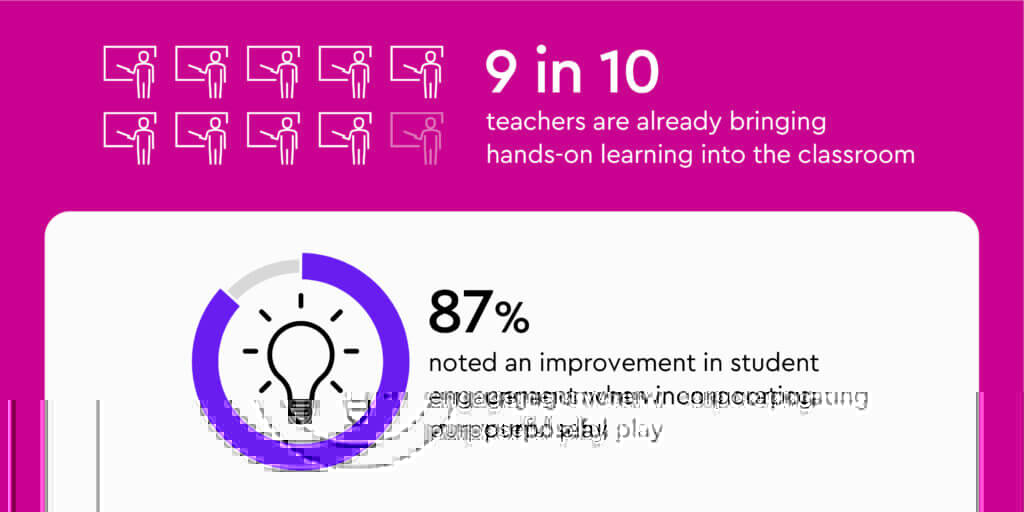
(© WavebreakMediaMicro - stock.adobe.com)
NEW YORK — Children should be having much more fun in school, according to eight in 10 parents. A recent survey of 1,000 parents with school-aged kids (K–12) found that 80 percent say their children either dislike school or are bored at school.
More than half the poll (57%) attributed this sentiment to challenging material that makes their kids feel like they’re falling behind. Another 52 percent say a lack of hands-on projects that foster collaboration and interaction also contribute.
Conducted by OnePoll on behalf of LEGO Education, the survey shows that hands-on learning is at the forefront of parents’ minds.
Need for STEAM
Seventy-four percent of parents recognize the value of STEAM (short for science, technology, engineering, the arts and mathematics) for the future, and a whopping 70 percent say their child is interested in exploring a STEAM career. However, three in four parents have also observed their kids getting excited about learning in elementary school, only to lose interest once they hit middle school.
From a parent’s perspective, the biggest roadblocks when moving from one grade to another are staying engaged or focused (52%), dealing with more challenging material (48%), and getting used to new teachers’ expectations (48%). Parents also say their kids sometimes get frustrated when working on challenging homework assignments (73%), with many attributing this to kids not understanding what they’re supposed to do (62%) and feeling too intimidated to ask questions (62%).
Additionally, the survey polled 1,000 teachers to discover how they’re bolstering students’ excitement in the classroom. Nine in 10 (91%) are already bringing hands-on learning into the classroom.
Regardless of the grade they teach, 87 percent noted an improvement in student engagement when incorporating purposeful play, such as hands-on STEAM activities.
Embracing gaming in school?
One way to make subjects more hands-on is through gamification or incorporating game-style elements into non-game activities. According to teachers, the most important ways to gamify the classroom are by making learning fun (74%), adding progress indicators such as points or badges (49%), and through competition (49%).
Comparatively, parents placed progress indicators (54%) and level progressions with increasing difficulty (52%) as the game-style elements they’d like teachers to incorporate most. The top skills parents hope their kids develop are learning to work under time pressure and deadlines (59%) and social-emotional skills like collaboration, resilience, empathy, and emotional regulation (57%).
“There’s never been a better time to rethink learning to make it more joyful, where classrooms are full of engaged students, ‘aha’ moments, and opportunities to build resilience and life skills,” says Dr. Jenny Nash, Head of Education Impact, U.S. for LEGO Education, in a statement. “This survey shows both teachers and parents want this for their students, and it’s with hands-on learning that we can create these motivating, memorable, and meaningful learning experiences for our students.”
Boosting students’ confidence and curiosity in the classroom can be key. Teachers have found the most effective ways to do so are with hands-on projects (70%) and having students work together with others (70%), along with the opportunity to make mistakes without judgment (63%). The freedom to make mistakes was the top choice among high school teachers (68%).
Eight in 10 (82%) teachers also believe group projects should be introduced much earlier in students’ lives.
“Teachers expressed awareness of the long-term effects STEM and STEAM can have for their students. Nearly eight in 10 (78%) said these concepts help improve collaboration, critical thinking and creativity, and seven in 10 (69%) believe they’ll improve students’ confidence,” Dr. Nash adds.












Yes,…..I found high school classes very boring. The learning environment should be set up more like college. Fall classes and spring classes, lasting only three months. 2 or three classes per semester. 9 months to study one subject,…. Boring. You don’t have time to get bored if you only leave 12 weeks to jam all that information in your head. I enjoyed college much more!
Seems bizarre to concern oneself with student boredom when the schools are rife with CRT brainwashing and “queer lifestyle” grooming.
I got bored of school once I hit 3rd grade! schools definitely need to step it up with the fun.